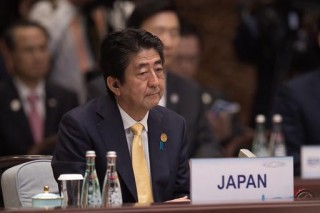Search
▼ Abe Calls On G-20 Leaders to Take Specific Actions for Growth
- Category:Other
HANGZHOU, China —Japanese Prime Minister Shinzo Abe called on fellow Group of 20 leaders on Sunday to take specific actions to accelerate growth, citing heightening downside risks as the outlook for the global economy remains hazy amid uncertainty.
The focus of the two-day gathering in the eastern Chinese city of Hangzhou will be whether advanced and emerging economies can work out detailed growth strategies. China, as host of the conference, aims to exercise strong leadership in moving discussions forward.
“In the face of the current challenges, we should strengthen macroeconomic policy coordination and work together to promote global economic growth and maintain financial stability,” Chinese President Xi Jinping said in his opening remarks.
During the G-20 summit through Monday, the leaders will also focus on such themes as innovation and growth, more efficient global economic and financial governance, and strong international trade and investment, Xi said.
Abe explained his government’s 28 trillion yen ($270 billion) economic stimulus package adopted in August to boost growth, centering on infrastructure investment and enhanced welfare services, and urged other leaders to “take specific actions.”
“It is important for the entire G-20 to share a sense of crisis and take specific actions,” Abe was quoted as saying by a Japanese official. “Advanced and emerging economies must unite and bring the global economy back onto a recovery path,” he said.
The meeting came at a time when global growth is being restrained by a slowdown in some emerging economies including China, which was the driving force of the world economy after the financial crisis following the collapse of Lehman Brothers in 2008.
China, which expanded more than 10 percent in 2010 from the year before to overtake Japan as the world’s second-largest economy, grew 6.7 percent in the April to June quarter as the country now pursues more moderate growth.
Meanwhile, many developed economies are struggling with tepid growth and low inflation, with Japan being stuck in chronic deflation, while being saddled with increasing government debts to cover snowballing social security and other expenses amid an aging society.
Structural reforms are also likely to become an important topic, with global trade being dampened by oversupply in China’s steel sector, although Beijing says it is making efforts to address the problem.
The leaders from the Group of Seven countries—Britain, Canada, France, Germany, Italy, Japan and the United States—plus emerging economies including Brazil, China and India, are likely to place emphasis on promoting global trade, but the prospects of the U.S. Congress ratifying a Pacific free trade deal involving 12 countries have become unclear amid a rise in protectionist sentiment.
“Free trade is an engine for growth and leaders have a political responsibility to break away from the temptation of protectionism,” Abe said, calling for swift ratification of the Trans-Pacific Partnership trade pact.
On top of slowing trade and investment, potential financial market volatility as well as geopolitical risks such as terrorism and the flow of migrants, continue to cast a pall over the global economic environment.
Uncertainty also remains over the possible effects of Britain’s decision to leave the European Union, which initially rattled global financial markets.
The International Monetary Fund said Thursday that the group’s 2014 goal of increasing collective growth by 2 percent by 2018 “seems out of reach,” urging the G-20 to take much stronger action to increase demand, promote structural reforms and boost trade.
Prior to the summit, the G-20 finance ministers separately held a meeting to exchange opinions on the global economy.
“I expressed my view that it is important to make utmost efforts to ensure stability in financial and currency markets,” as excessive and disorderly currency moves will have negative effects on the economy, Japanese Finance Minister Taro Aso told reporters.
At the end of the gathering on Monday, the G-20 leaders are expected to adopt a “Hangzhou consensus,” pledging to bolster global economic growth by employing fiscal spending, monetary policy and structural reforms.
The G-20 leaders will also pledge to “work harder to build an open world economy, reject protectionism, and promote global trade and investment” by boosting the multilateral system of trade, according to a draft document obtained by Kyodo News.
On currency markets, the G-20 leaders are expected to restate their opposition to competitive devaluations aimed at boosting exports, while reiterating that “excessive volatility and disorderly movements in exchange rates can have adverse implications for economic and financial stability.”
© KYODO
- September 5, 2016
- Comment (0)
- Trackback(0)


